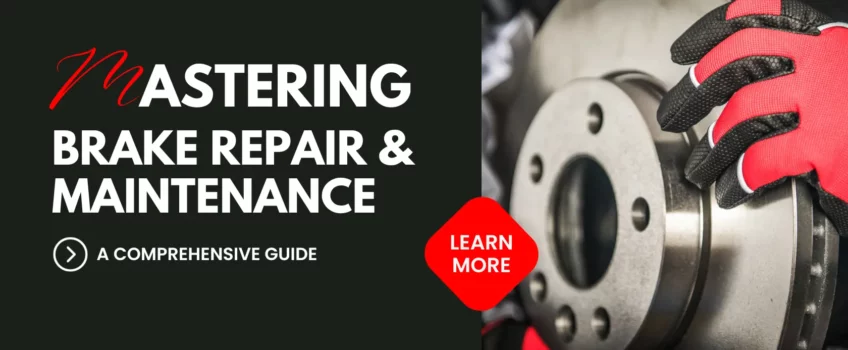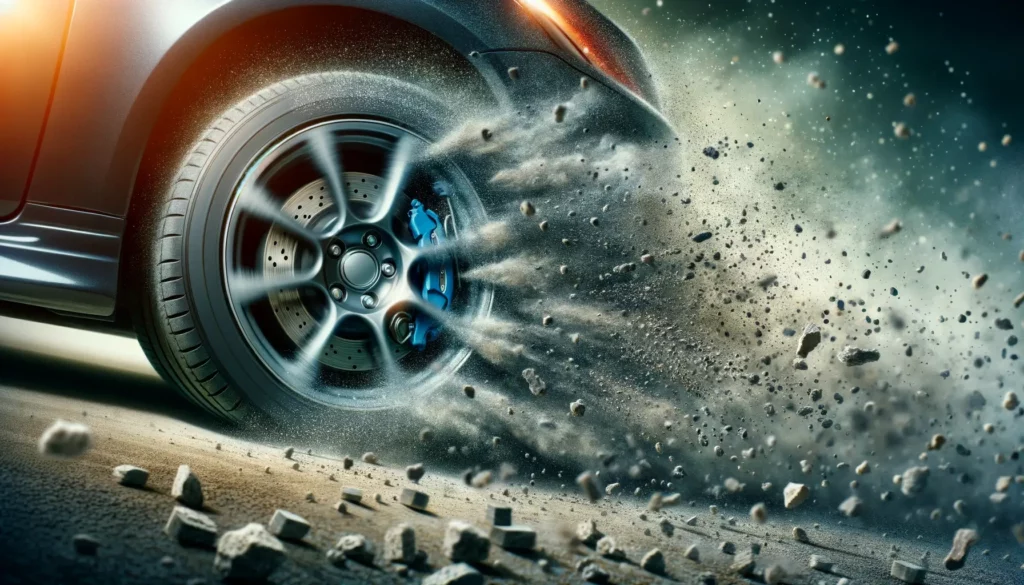
Brake Right, Drive Safe: Your Ultimate Guide to Brake Repair
The braking system is arguably the most important safety feature of any vehicle. It is responsible for bringing your vehicle to a stop and preventing accidents. That’s why ensuring that your brakes are working properly should always be a top priority. Regular brake maintenance and repair is crucial for safe and efficient driving. In this guide, we will discuss everything you need to know about brake repair.
Signs of Brake Problems
The first step in maintaining your braking system is being aware of any potential issues. Here are some common warning signs that may indicate a problem with your brakes:
- Squeaking or grinding noises when applying the brakes
- Vibrations or pulsating sensations in the brake pedal when applying pressure
- Longer stopping distances or difficulty bringing your vehicle to a complete stop
- A spongy or soft feeling when pressing the brake pedal
If you notice any of these signs, book a brake repair or brake replacement service as soon as possible to avoid further damage and ensure your safety on the road.
Recommended: What Does A Typical Brake Service Include?
Brake Repair and Maintenance Checklist
Regular brake maintenance and repair is essential for optimal performance and safety. Here are some important tasks to include in your brake maintenance checklist:
- Checking the thickness of your brake pads: Your brake pads wear down over time and need to be replaced when they reach a minimum thickness. This can vary depending on your vehicle, so it’s important to consult your owner’s manual or have a professional check them.
- Inspecting and cleaning brake components: Brake dust, dirt, and debris can build up on your braking system over time, affecting its performance. Regularly inspecting and cleaning your brake components can help prevent this buildup.
- Flushing and replacing brake fluid: Brake fluid is vital for the proper functioning of your brakes. Over time, it can become contaminated and less effective, so it’s important to have it flushed and replaced according to your vehicle’s recommended schedule.
- Checking brake lines and hoses: It’s important to regularly inspect the lines and hoses that carry brake fluid to ensure they are in good condition and free from any leaks or damage.
- Replacing worn or damaged parts: Any worn or damaged components in your braking system, such as rotors or calipers, should be replaced to ensure proper functioning of your brakes.
When to Seek Professional Brake Repair Services
While some minor brake maintenance tasks can be done at home, it’s always best to seek professional help for more complex repairs. Here are some scenarios where you should take your vehicle to a qualified mechanic:
- Your brake warning light is on: If your brake warning light is illuminated, it could indicate a variety of issues that require professional attention.
- Unusual noises or sensations when braking: If you experience any unusual noises or vibrations when applying the brakes, it’s best to have a mechanic inspect them to determine the cause.
- Brake fluid leaks: Any signs of brake fluid leaking should be addressed immediately by a professional mechanic.
- Brake pedal feels different: If your brake pedal feels spongy, soft, or requires more force than usual to stop your vehicle, it could indicate a problem with your braking system that needs to be addressed by a professional.
The Role of Brakes in Environmental Sustainability

Brake systems have a significant impact on the environment, particularly through brake dust emissions. Research has shown that brake dust can contribute to air pollution, especially in urban areas. According to Fleet News, “brake dust is the source of approximately 20% of total traffic-related particulate matter emissions”. The fine particles from brake wear can contribute to air quality issues and have health implications; being compared to diesel exhaust pollution.
However, advancements in brake technology, such as regenerative braking systems found in electric vehicles, are helping to reduce these emissions. These systems recover energy during braking, which not only reduces wear and tear on the brake system but also minimises the production of harmful brake dust.
The Importance of Regular Brake Repair and Maintenance
Regular brake repair and maintenance is not just a responsibility; it’s a crucial aspect of ensuring your vehicle’s safety and efficiency. Elite Garages, known for their impeccable brake repair services, stands at the forefront of this essential automotive care. Understanding the importance of brakes and the role they play in your driving experience is key to maintaining your vehicle’s longevity and your peace of mind.
Comprehensive Brake Repair Services at Elite Garages
Elite Garages offers a wide range of brake repair services to keep your vehicle running smoothly. Our services include:
- Thorough Brake System Inspection: Our experts meticulously examine your car’s brake pedals, lights, and parking brake, including the anti-lock brake system.
- Brake Discs Examination and Maintenance: We ensure your brake discs are within the manufacturer’s specifications, checking for any wear and tear.
- Calliper and Mount Inspection: A detailed examination of callipers and mounts is conducted to ensure even wear and optimal functioning.
- Brake Pads Replacement: We use high-quality OEM parts for brake pad replacements, aligning with manufacturer specifications for enhanced safety.
Maximising Brake Lifespan: Tips and Tricks
To extend the life of your car’s brakes, and to ensure you arrive at your destination safely, consider the following tips:
- Adopt Smooth Driving Habits: Avoid abrupt stopping and start driving smoothly.
- Regular Check-Ups: Schedule regular brake inspections and maintenance.
- Use High-Quality Brake Parts: Always opt for quality parts recommended by the manufacturer.
- Regular Fluid Checks: Brake fluid is crucial for the hydraulic system. Ensure it’s at the correct level and changed according to the manufacturer’s guidelines.
- Avoid Overloading Your Vehicle: Excessive weight increases braking distance and wears brakes out faster.
- Be Aware of Brake Pad Thickness: Regularly check the thickness of your brake pads. Thin pads can damage brake discs and reduce braking efficiency.
Recommended: What Are The Driving Requirements For France?
A Glimpse into the Past: The Invention of Car Brakes
Bertha Benz invented the first car brake system in 1888. During a long-distance trip in the Benz Patent-Motorwagen, she realised the need for a more effective braking system and invented brake lining. Her design involved a leather pad that pressed against the vehicle’s wheels when engaged. While this system has evolved significantly, the fundamental concept of applying friction to slow a vehicle remains the same.
Today’s brake systems are far more sophisticated, using hydraulic technology and electronic controls for enhanced safety and efficiency. Modern brakes, such as anti-lock braking systems (ABS) and disc brakes, provide greater stopping power and reliability. The evolution of brakes reflects the technological advancements in the automotive industry, with ongoing innovations aimed at improving safety and reducing environmental impact.
Why Choose Elite Garages for Your Brake Repair Needs?
Our highly skilled and experienced team of vehicle technicians is dedicated to providing top-notch brake repair and brake replacement servicing. We use state-of-the-art equipment to ensure precise and effective brake maintenance, emphasising our commitment to quality and safety.
Moreover, our transparent pricing policy reflects our dedication to providing affordable quality, ensuring you receive great value without compromising on service. Our brake repair centres consistently use top-tier, durable parts for every service, ensuring the longevity and reliability of your vehicle’s braking system.
FAQS:
Click the + to read any answer or visit our most FAQ page to review the most frequently asked questions across all our Elite Locations.
If you click on a ‘Category’ or ‘Tag’ link, the page will ‘refresh’ and reload the page showing the top of the page first, you’ll then just need to scroll down to the FAQ section to see the results for the Category or Tag you selected.
The frequency of brake service can depend on various factors including driving habits, driving conditions, and the type of vehicle. However, a general rule of thumb is to have your brakes inspected at least once a year or every 10,000 to 15,000 miles. Of course, if you notice any unusual sounds, reduced brake responsiveness, or any other irregularities in braking performance, it’s important to seek professional brake service immediately.
The time between brake services is influenced by the quality of components used, the expertise of the servicing team, and the car’s usage patterns. Brake pads, for example, typically need replacement every 30,000 to 70,000 miles, though this can vary. It’s best to keep an eye on your brake pads or brake discs and to book a free visual brake inspection at Elite Garages if you have any doubt..
Absolutely! Brake service is integral to not only your car’s performance but, more importantly, to your safety and that of other road users. Brake systems are subjected to wear and tear over time, and regular servicing ensures they remain effective and responsive. Ignoring brake service can lead to decreased brake efficiency, posing potential risks on the road. In essence, a routine brake service is a small investment that yields significant returns in safety, performance, and vehicle longevity
About Us
Opening Times
Saturday : 8:30–4:00
Sunday : closed
More Information
Contact UsCustomer Information Pack
Check MOT Due Date
Free MOT reminder
Careers
Legal Information
Recent Posts
- Elite Garages Croydon Is Open for Car Servicing and MOTs in South London
- Elite Garages Poole Is Now Open for MOTs, Tyres and Car Servicing
- The Most Common Car Questions UK Drivers Ask, And What They Usually Mean
- Why Short Winter car Journeys Cause So Many Common Car Problems
- Why Car Problems Happen More Often in January (And What Drivers Miss)


